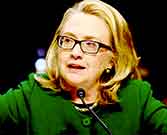|

|
The
views expressed
on this page are soley those of the author and do not
necessarily
represent the views of County News Online
|
 |
The Daily Signal
Benghazi
Bombshell: Clinton Alleged Document Review
Sharyl Attkisson
September 15, 2014
Hillary Clinton testifies before the U.S. Senate Committee on Foreign
Relations on "Benghazi: The Attacks and the Lessons Learned" in
Washington, D.C., on Jan. 23, 2013. (Photo: Ron Sachs/Newscom)
As the House Select Committee on Benghazi prepares for its first
hearing this week, a former State Department diplomat is coming forward
with a startling allegation: Hillary Clinton confidants were part of an
operation to “separate” damaging documents before they were turned over
to the Accountability Review Board investigating security lapses
surrounding the Sept. 11, 2012, terrorist attacks on the U.S. mission
in Benghazi, Libya.
UPDATE: Hillary Clinton’s chief of staff allegedly present at
after-hours document review.
According to former Deputy Assistant Secretary Raymond Maxwell, the
after-hours session took place over a weekend in a basement
operations-type center at State Department headquarters in Washington,
D.C. This is the first time Maxwell has publicly come forward with the
story.
At the time, Maxwell was a leader in the State Department’s Bureau of
Near Eastern Affairs, which was charged with collecting emails and
documents relevant to the Benghazi probe.
“I was not invited to that after-hours endeavor, but I heard about it
and decided to check it out on a Sunday afternoon,” Maxwell says.
He didn’t know it then, but Maxwell would ultimately become one of four
State Department officials singled out for discipline—he says
scapegoated—then later cleared for devastating security lapses leading
up to the attacks. Four Americans, including U.S. Ambassador
Christopher Stevens, were murdered during the Benghazi attacks.
‘Basement Operation’
Maxwell says the weekend document session was held in the basement of
the State Department’s Foggy Bottom headquarters in a room underneath
the “jogger’s entrance.” He describes it as a large space, outfitted
with computers and big screen monitors, intended for emergency
planning, and with small offices on the periphery.
When he arrived, Maxwell says he observed boxes and stacks of
documents. He says a State Department office director, whom Maxwell
described as close to Clinton’s top advisers, was there. Though the
office director technically worked for him, Maxwell says he wasn’t
consulted about her weekend assignment.
“She told me, ‘Ray, we are to go through these stacks and pull out
anything that might put anybody in the [Near Eastern Affairs] front
office or the seventh floor in a bad light,’” says Maxwell. He says
“seventh floor” was State Department shorthand for then-Secretary of
State Clinton and her principal advisers.
“I asked her, ‘But isn’t that unethical?’ She responded, ‘Ray, those
are our orders.’ ”
A few minutes after he arrived, Maxwell says, in walked two
high-ranking State Department officials.
In an interview Monday morning on Fox News, Rep. Jason Chaffetz,
R-Utah, named the two Hillary Clinton confidants who allegedly
were present: One was Cheryl Mills, Clinton’s chief of staff and
a former White House counsel who defended President Bill Clinton during
his impeachment trial. The other, Chaffetz said, was Deputy Chief of
Staff Jake Sullivan, who previously worked on Hillary Clinton’s and
then Barack Obama’s presidential campaigns.
“When Cheryl saw me, she snapped, ‘Who are you?’” Maxwell says. “Jake
explained, ‘That’s Ray Maxwell, an NEA deputy assistant secretary.’ She
conceded, ‘Well, OK.’”
Maxwell says the two officials, close confidants of Clinton, appeared
to check in on the operation and soon left.
Maxwell says after Mills and Sullivan arrived, he, the office director
and an intern moved into a small office where they looked through some
papers. Maxwell says his stack included pre-attack telegrams and cables
between the U.S. embassy in Tripoli and State Department headquarters.
After a short time, Maxwell says he decided to leave.
“I didn’t feel good about it,” he says.
We contacted Mills and Sullivan to ask about the allegations and the
purpose of the described separation of documents, but they did not
return calls or emails. We reached out to Clinton, who declined an
interview request and offered no comment. A State Department spokesman
told us it would have been impossible for anybody outside the
Accountability Review Board (ARB) to control the flow of information
because the board cultivated so many sources.
‘Unfettered Access’?
When the ARB issued its call for documents in early October 2012, just
weeks after the Benghazi attacks, the executive directorate of the
State Department’s Bureau of Near Eastern Affairs was put in charge of
collecting all emails and relevant material. It was gathered, boxed
and—Maxwell says—ended up in the basement room prior to being turned
over.
In May 2013, when critics questioned the ARB’s investigation as not
thorough enough, co-chairmen Ambassador Thomas Pickering and Adm. Mike
Mullen responded that “we had unfettered access to everyone and
everything including all the documentation we needed.”
Maxwell says when he heard that statement, he couldn’t help but wonder
if the ARB—perhaps unknowingly—had received from his bureau a scrubbed
set of documents with the most damaging material missing...
Read the rest of the article with photos and video at The Daily Signal
|
|
|
|

